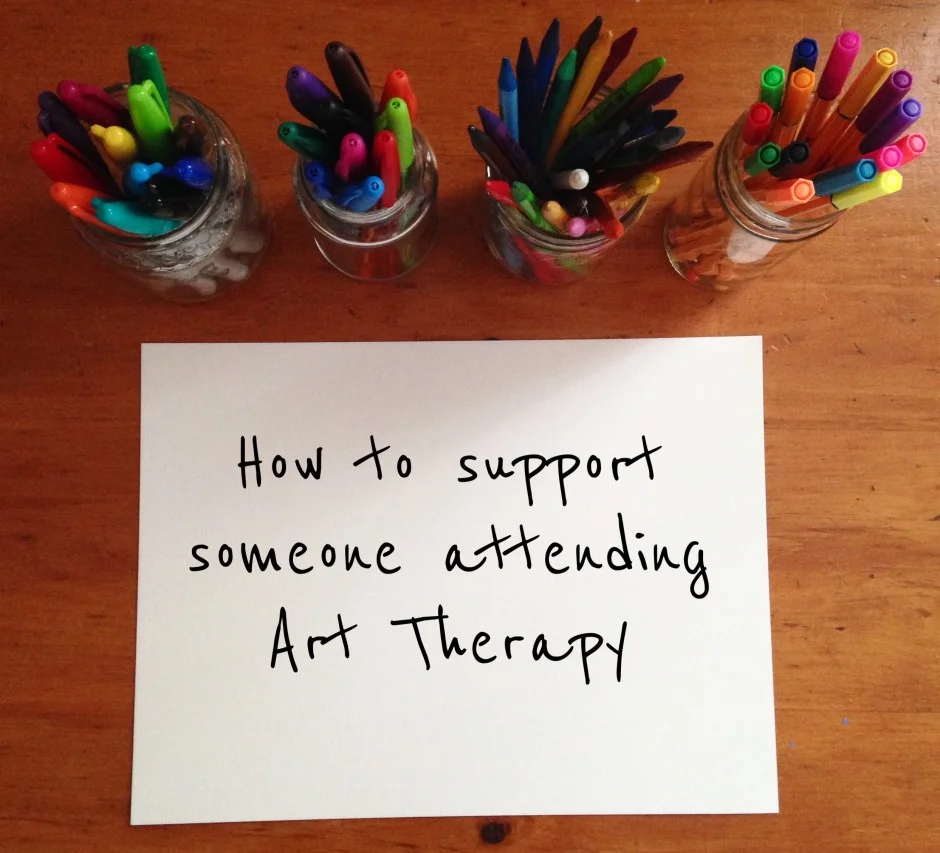Today we want to say thank you to parents, caregivers, friends, or supporters of clients attending art therapy. You are an incredibly important piece of the puzzle for the work we do at Art as Therapy. Through the roles that you play in our clients’ lives, you directly or indirectly support the process of art therapy in many ways. This may mean that you provide transportation, childcare, reminders about appointments, or even consent for clients to attend. While we may sometimes only be aware of the physical ways in which you offer your support, we imagine that you also support our clients emotionally.
Despite the best intentions it can sometimes be tricky to know just how to offer emotional support for someone attending art therapy. Based on our work with clients, families, and support staff, here are 5 ideas that may help you show your support for the art therapy process:
- Spend some time reflecting on your personal values and comfort level with the idea of art therapy. Have you had any personal experiences with therapy? Do your past experiences influence your feelings about someone you love attending art therapy? What kinds of messages have you received about therapy? How do these impact your view of your role as a supporter? When we acknowledge our own feelings and experiences, it allows us to recognize how they impact our behaviour. Recognizing our own comfort level with the idea of therapy will help us to take care of ourselves as we offer support for those we love.
- Respect the client’s confidentiality and comfort level. Art therapy sessions are confidential, meaning that the therapist will not share with anyone about what a client brings into the session (except of course if the information exceeds the limits of confidentiality, see our consent form for details). However, the client is free to share anything they would like about their sessions with anyone they choose. Some clients really enjoy debriefing a session with a parent or friend, while others like to keep private any details about what they did or what they made. It may seem tricky to express interest while respecting confidentiality. If you feel comfortable with hearing about the sessions, and you would like to offer the option to a client, the key is to allow the client to share on his or her terms. This empowers the client because it gives them the power to choose what and when to share, and reinforces the message that the art therapy sessions are a safe place. Instead of asking direct questions like “What did you do today?” or “Can I see what you made?” try offering an open invitation instead. “If you feel like sharing anything about your session today I am available to listen and would love to hear about it. If you don’t want to share that’s totally okay. The art therapy sessions are your time and your safe space.” For more information on how to talk to clients about the artwork they make during an art therapy session, check out our blog post called “How to ask children empowering questions about their art.” http://artastherapy.ca/how-to-empower-children-to-share-about-their-artwork/
- Be prepared to offer a little TLC. Even though we work with art supplies and sometimes even play with toys, this does not mean that every art therapy session is fun. Sometimes difficult feelings are expressed or challenging topics are addressed. After an emotionally intense session, clients may really benefit from some good old fashioned tender love and care. This may mean an extra snuggle at bed time for the little ones, or making a teen’s favourite meal, or grabbing a coffee with your friend on the drive home. Offer these comforts along with the invitation (free of expectation) that they can share with you if and when they are ready, on their own terms.
- Trust the process. Art therapy is intended to create shifts in perspective and behavior as clients tap into their inner strengths and use these to regulate emotions, build relationships, and reach their full potential. Sometimes as shifts begin to occur, behaviours can get worse before they get better. Change can be hard, and sometimes one step forward is followed by two steps back. However, we believe in the process of art therapy and we know that ultimately it works. As a supporter, one of the best things you can do for a client is to trust the process too.
- Share experiences from your own journey. As a supporter, you have a unique perspective on the clients’ art therapy journey, in addition to your own experience of the process. Even if a client does not want to share about their sessions, you can show your support by sharing elements of your experience as you feel comfortable. For example, you may notice that the client appears to be calmer after coming out of an art therapy session. Or you may notice some of those shifts in perspective or behaviour as they happen over time. If you feel comfortable, you can share these with the client. This shows that you have been paying attention and that you care about the process. Your observations may help the client to make connections and to put their art therapy experiences into a larger context.
At Art as Therapy, we greatly value our relationships with parents, caregivers, support workers, friends, and family members who support our clients. We believe that you are the experts in our clients’ lives and you know them the best. We want to partner with you and really leverage on your expertise if you will allow us the opportunity to do so. We also want to be able to support you in your relationship with our clients. We want to hear from you – how can we offer support for you? Send us an email to admin@artastherapy.ca or call us at 519 307 9000. Let’s start the conversation.
Written by Rubi Garyfalakis, Art Therapist at Art as Therapy

